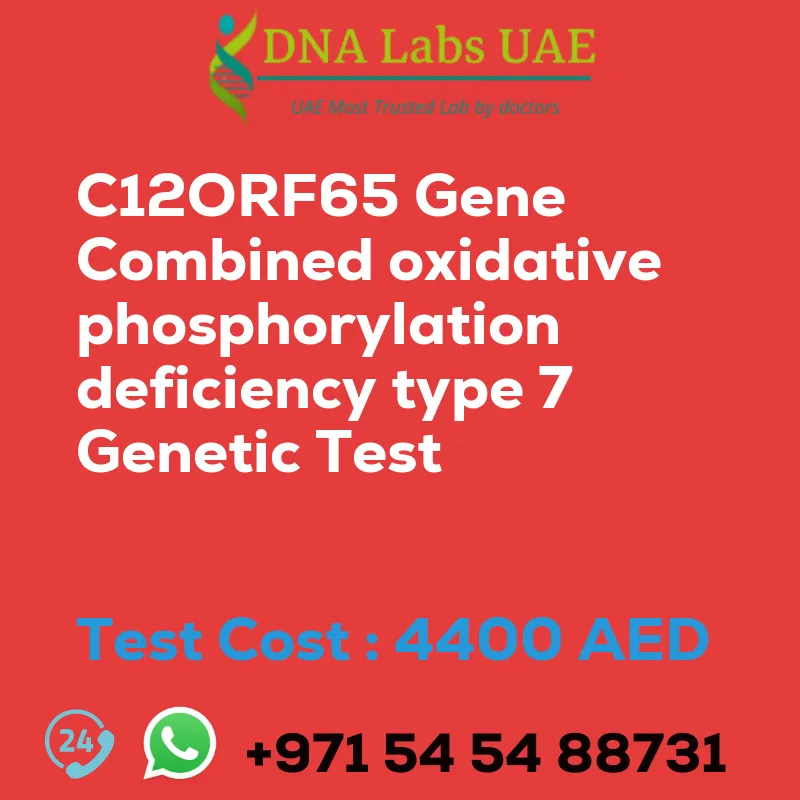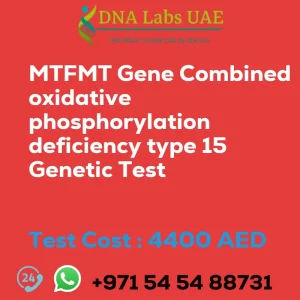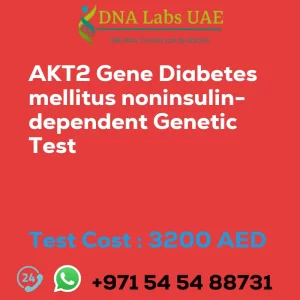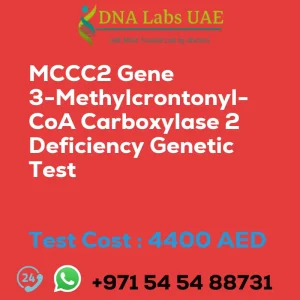C12ORF65 Gene Combined oxidative phosphorylation deficiency type 7 Genetic Test
Test Name: C12ORF65 Gene Combined oxidative phosphorylation deficiency type 7 Genetic Test
Components: Blood or Extracted DNA or One drop Blood on FTA Card
Price: 4400.0 AED
Sample Condition: Blood or Extracted DNA or One drop Blood on FTA Card
Report Delivery: 3 to 4 Weeks
Method: NGS Technology
Test Type: Metabolic Disorders
Doctor: General Physician
Test Department: Genetics
Pre Test Information: Clinical History of Patient who is going for C12ORF65 Gene Combined oxidative phosphorylation deficiency type 7 NGS Genetic DNA Test. A Genetic Counselling session to draw a pedigree chart of family members affected with Combined oxidative phosphorylation deficiency type 7.
Test Details: The C12ORF65 gene is associated with a rare genetic disorder called Combined Oxidative Phosphorylation Deficiency Type 7 (COXPD7). This disorder affects the mitochondria, which are responsible for producing energy in the form of ATP. COXPD7 is characterized by a wide range of symptoms that can vary in severity. Some common symptoms include muscle weakness, developmental delay, intellectual disability, seizures, and respiratory problems. These symptoms are often present from infancy or early childhood. To diagnose COXPD7, a Next-Generation Sequencing (NGS) genetic test can be performed. This test analyzes the DNA sequence of the C12ORF65 gene to identify any mutations or abnormalities. NGS technology allows for the simultaneous analysis of multiple genes, making it a useful tool for diagnosing genetic disorders like COXPD7. If a mutation is identified in the C12ORF65 gene, it confirms a diagnosis of COXPD7. Genetic testing can also be useful for carrier testing in families with a known history of the disorder or for prenatal testing in pregnancies at risk. It’s important to note that COXPD7 is a rare disorder, and genetic testing should be conducted by a healthcare professional with expertise in genetics. Genetic counseling is also recommended to help individuals and families understand the implications of the test results and to discuss potential treatment options and management strategies.
| Test Name | C12ORF65 Gene Combined oxidative phosphorylation deficiency type 7 Genetic Test |
|---|---|
| Components | |
| Price | 4400.0 AED |
| Sample Condition | Blood or Extracted DNA or One drop Blood on FTA Card |
| Report Delivery | 3 to 4 Weeks |
| Method | NGS Technology |
| Test type | Metabolic Disorders |
| Doctor | General Physician |
| Test Department: | Genetics |
| Pre Test Information | Clinical History of Patient who is going for C12ORF65 Gene Combined oxidative phosphorylation deficiency type 7 NGS Genetic DNA Test A Genetic Counselling session to draw a pedigree chart of family members affected with Combined oxidative phosphorylation deficiency type 7 |
| Test Details |
The C12ORF65 gene is associated with a rare genetic disorder called Combined Oxidative Phosphorylation Deficiency Type 7 (COXPD7). This disorder affects the mitochondria, which are responsible for producing energy in the form of ATP. COXPD7 is characterized by a wide range of symptoms that can vary in severity. Some common symptoms include muscle weakness, developmental delay, intellectual disability, seizures, and respiratory problems. These symptoms are often present from infancy or early childhood. To diagnose COXPD7, a Next-Generation Sequencing (NGS) genetic test can be performed. This test analyzes the DNA sequence of the C12ORF65 gene to identify any mutations or abnormalities. NGS technology allows for the simultaneous analysis of multiple genes, making it a useful tool for diagnosing genetic disorders like COXPD7. If a mutation is identified in the C12ORF65 gene, it confirms a diagnosis of COXPD7. Genetic testing can also be useful for carrier testing in families with a known history of the disorder or for prenatal testing in pregnancies at risk. It’s important to note that COXPD7 is a rare disorder, and genetic testing should be conducted by a healthcare professional with expertise in genetics. Genetic counseling is also recommended to help individuals and families understand the implications of the test results and to discuss potential treatment options and management strategies. |








